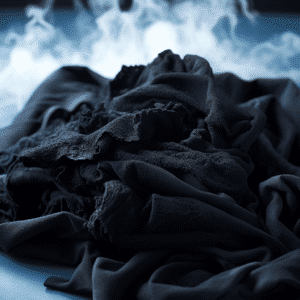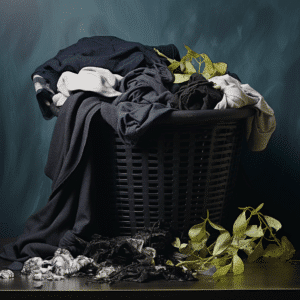Have you seen black flakes on your clothes recently after washing them? You may have attempted to wash them away after removing your laundry from the machine. However, the next time you do a load of laundry, they will appear again.
There is certainly a reason for black flakes on your garments after removing them from the washing machine. Continue reading to learn about the causes and remedies to the problem of black flakes on your clothes after washing.
Table of Contents
What Causes Black Flakes In the Washing Machine

Many people are bothered by the appearance of the unsightly black flakes on their clothes after they have been washed. There’s much discussion as to why these happen.
The black flakes are caused by bacteria, grease, and mold accumulation. These accumulations result from a variety of issues that arise throughout the washing process.
- Use of environmentally friendly soaps. While ecologically friendly soaps are beneficial for the environment, they don’t contain bleach that scours the inside of your washing machine while it cleans the clothes. Due to a lack of aggressive cleaning agents, slimy germs can grow up inside the washing machine.
- Use of a lower-than-recommended detergent dose in each wash. If you don’t use enough detergent when washing your clothes, it could harm the cleanliness of your machine.
Regardless of the origin of the black flakes, whether it’s due to insufficient soap or a different type of soap, the problem can be resolved as explained in the section below.’
How to Get Rid of Black Flakes in Washing Machine
To get rid of the black flakes in your washing machine, first, go to your local grocery store and get a packet of citric acid. After acquiring the citric acid, you can undertake the following procedure before going to bed:
- Allow your washing machine to fill with hot water before adding the citric acid to the water.
- Run your machine for a full cycle, then drain the hot water/ citric acid solution.
- Fill the washing machine with hot water and a citric acid solution. Allow the solution to rest in the bowl overnight this time. (there will be no cycle)
- Set your machine to spin and drain the next morning.
- Set your machine to only fill with hot water, then spin and drain it. This will assist in flushing out any lingering residue in the bowl.
Tips To Keep Your Washing Machine Running Its Best
Leave the Lid Open after Washing Your Clothes
Mold thrives in dark, wet environments. This is what your washer becomes after you have removed your clothes. It is thus advisable to leave the lid of your washing machine open to ventilate it and prevent mold from forming.
Dry Damp Seals and Parts of Your Washing Machine after Each Use
Make sure to wipe down any damp parts of your washing machine after you’ve finished using it for the day. The drum, lid, door, detergent dispenser, and rubber gaskets are all included. For this purpose, keep an old towel on hand.
To avoid moisture from sticking around, make sure to dry the seal along with the rest of your washer. While mold contamination can occur in any washer, high-efficiency front-loading washers are particularly susceptible. That is why you should clean the seals and gaskets around the door regularly and keep them dry.
Also, remember to remove the crumpled papers, pet hair, and any other filth from the washing machine as soon as possible.
Never Leave Your Wet Clothes in the Machine When the Cycles is Finished
If you’re going to throw a load of laundry in the washer, make sure you’ll be home when the timer goes off to remove the clothes. That is to say, do not start the washer before going to bed or heading to work. This not only keeps mold out of your washer but also stops your clean clothes from mildewing.
Only Use HE Detergent Powder in an HE Washing Machine
Liquid detergents can leave residues in your washer, providing a food supply for mold. So, if you have a HE washer, the first step in preventing mold is to use a laundry detergent designed exclusively for this type of machine, which will produce fewer suds. Better yet, avoid liquid detergent altogether and opt for powder or pods instead. And, regardless of which option you choose, make sure you only use as much detergent as you require to wash your clothing. If you use too much, the detergent might leave a smell and residue on your clothes.
Other Frequently Asked Questions
Why Are There Brown Flakes in My Washing machine?
Brown flakes are commonly due to rust build-up in your washing machine. There are two main causes for this to occur.
First, when chlorine bleach is used in hard water, it separates the iron or manganese from the water and causes it to build up in the washing machine. When too much of the mineral has accumulated in your machine, it begins to flake off. Brown, red, or black flakes can be found. To fix this, fill the washer halfway with water and add half a cup of either rust remover, such as CLR, or a powdered citrus drink mix, such as tang, or two cups of either lime or lemon juice. Allow the washer to complete a full cycle. Once the rust is gone, you can prevent this from happening again by acquiring a home water softener or avoiding using chlorine bleach to reduce the iron.
Another less common way that can lead to the formation of rust in your washer is if the drum is worn down and the metal is starting to rust. This can be fixed either by cleaning off the rust and sealing the metal or by replacing the drum.
How to remove brown flakes from washing machine
If you have brown flakes in your washing machine, you want them gone. The first thing to do is determine what they are. If they are mold, that’s a big problem. Mold can cause health issues. If the particles appear black and flaky, they’re likely grease, soap scum, or bacteria. This can be removed by cleaning your washing machine with special washing machine cleaners or white vinegar. You may need to run an empty cycle first before doing so.
If you use your washing machine’s self-cleaning setting, follow the instructions provided in its user manual. Afterward, wipe down the seal and the inside of your washing machine with a cloth to remove any remaining residue or buildup.
It’s important to note that soaps that are considered “environmentally friendly” don’t contain bleach, a harsh cleaning agent. This lack of a strong chemical can lead to buildups of slimy bacteria inside your washing machine.
Also, using inadequate amounts of detergent when washing your clothes can compromise the cleanliness of your washer, leading to the formation of black flaky stuff inside your machine.
Whatever the cause, you should clean your machine regularly: Here’s how to do it properly:
- Please follow the process outlined above.
- If you’ve got a front-loading washing machine, leave the door open after every load. This will allow fresh air to circulate around your washer, which prevents a buildup of bacteria and mold.
- Never leave wet clothes in the washing machine when it stops running: moisture trapped inside can lead to mold growth.
How to get rid of black flakes in LG washing machine

If you have a problem with black flakes in your LG washing machine, here are some tips to help you fix it:
- Dissolve 2 or 3 dishwasher tablets in a bucket. Then, put the solution into the drum, turn on your washer and let it run through its longest and hottest cycle.
- Pour 2 x 75g canisters of citric acid into the drum, turn on your washer and let it run through its longest and hottest cycle.
- Wipe the rubber seal where the door meets the body of your machine with a clean cloth.
Black particles on clothes after washing
This is a sign that you may need to clean the inside of your washer.
If your washer is old or hasn’t been cleaned for a while, you may have a buildup of bacteria and mold on the inside. This will eventually come off in your wash cycle.
It may also be caused by not using the recommended amount of detergent or fabric softener, allowing your clothes to sit in the washer for too long before drying them, and not cleaning out your lint trap.
Why is there Lint All over My Clothes after Washing?
The overuse of fabric softener mainly causes lint. Below are the various ways of avoiding lint:
- Instead of fabric softener, use vinegar.
- Wool balls can be used in place of fabric softener.
- Every once a week, run an empty wash with hot water and vinegar.


